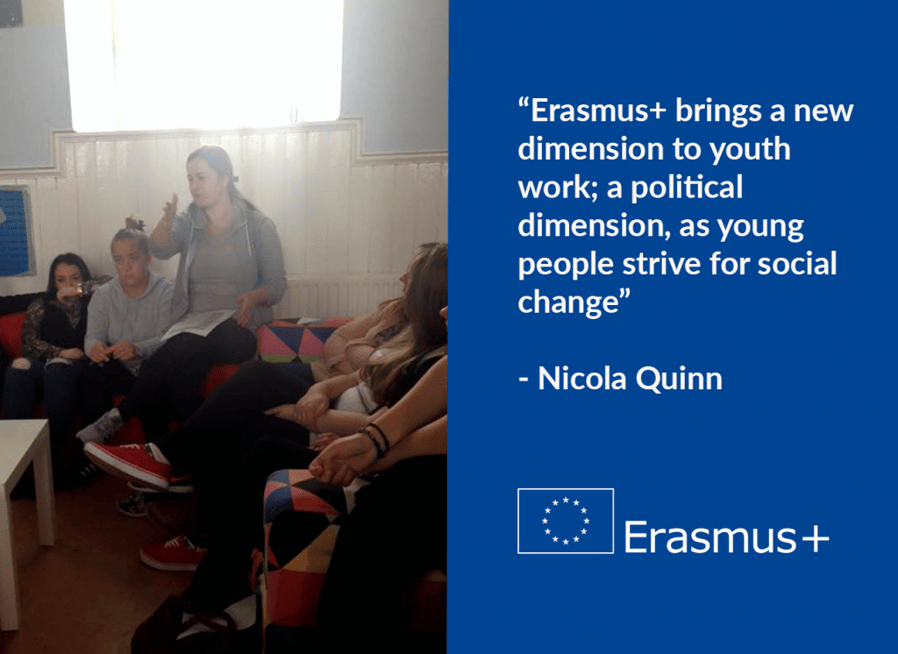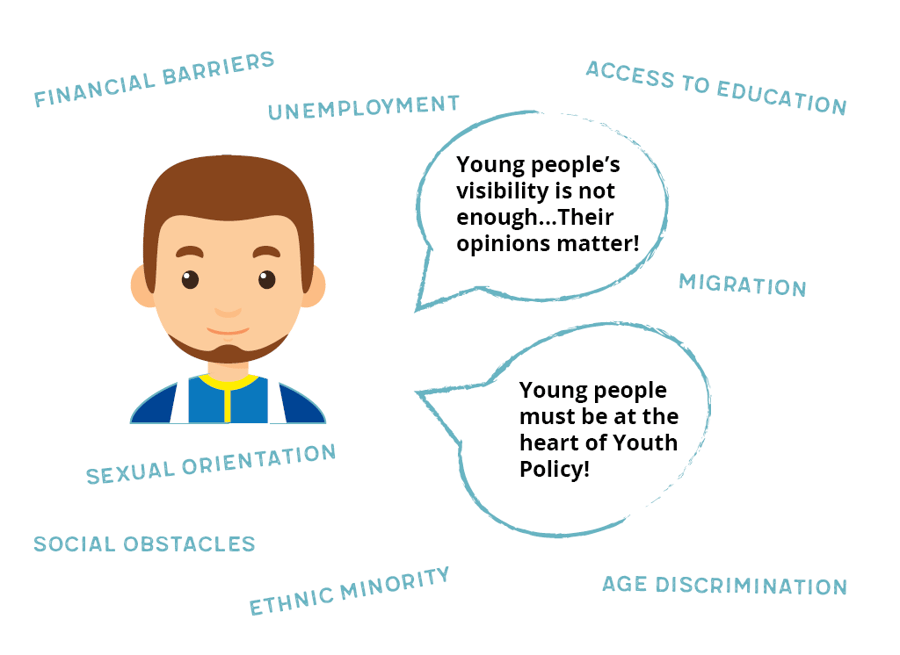Why get involved in Erasmus+ KA3, Structured Dialogue?
Nicola Quinn has been involved in youth work since the age of 10! She has volunteered on short and long-term European Voluntary Service; has participated in and hosted youth exchanges and is now in her final year of Community and Youth Work at Maynooth University. We were delighted to have her with us during her work placement where she brought her passion for Youth Work to the promotion of Erasmus+. Here Nicola discusses the benefits of Erasmus+ KA3, Structured Dialogue.
My name is Nicola Quinn and I am 26 years old. I am in my final year of the BA in Community and Youth work at Maynooth University. As part of my studies, I have completed a student work placement with Léargas. In my time with Léargas I worked on promoting Key Action 3 of Erasmus+. This entailed analysing the link between youth work and policy engagement.
On 29 November I hosted a Project Briefing day at Léargas for youth workers and other professionals working with young people where I shared my analysis of Key Action 3. The theme I developed for the briefing was Action Changes Things. I think it sums up clearly the impact Erasmus+ KA3, Structured Dialogue projects can have.
Action Changes Things was a call-out to inspire youth workers and other professional working with young people to engage with Erasmus+ Key Action 3, Structured Dialogue. Getting involved in Erasmus+ brings a new dimension to Youth work, a political dimension, as young people strive for social change. The incentive is that young people are provided with opportunities to understand the policy-making process, engage with key decision makers and influence policy that affects them.
Why get involved in Erasmus+ KA3, Structured Dialogue?
It is no secret that professionals in the field of youth are working everyday with young people to tackle inequality in society, in areas such as gender, migration, homelessness, racism, employment, LGBT, education and the refugee crisis. They do this at local, national and European level. Erasmus+ KA3, Structured Dialogue can aid this work as it focuses on the active participation of young people in democratic life. Participation, Empowerment, Development, Learning and Inclusion are fundamental to youth work and are also the core objectives of Erasmus+. Key Action 3 prioritises:
- Skills development of young people
- Active citizenship
- Intercultural dialogue
- Solidarity
- Social Inclusion.
Young people get the opportunity to meet other young people and exchange ideas on issues that are important to them. A KA3 project has the potential to bring people through experiential learning on a positive learning journey to improve their understanding of governmental institutions and policies.
What do you need to know when planning a KA3 project?
- Young people aged 13-30 can participate
- A minimum of 30 participants must be involved throughout the lifetime of the project
- A smaller core group of young people can lead it but they should engage with at least 30 young people throughout the project
- Project duration can be between 3 and 24 months
- You do not need a partner from another country! Projects can focus on local, regional or national issues
- You can choose to have a partner from another country if you want to organise transnational meetings
- Young people identify issues of concern to them, at local, national and European level
- It is essential that young people are supported to identify key decision makers and relevant youth experts to engage in meaningful discussions with and effectively influence policy.
Who is involved in a KA3 project?
In a KA3 Structured Dialogue project decision makers, youth experts and stakeholders engage in meaningful discussions and debates with young people. It has the potential to provide solid opportunities for young people to show policy-makers the dimensions and implications of the issues on the ground affecting the lives of young people.
Ultimately KA3 is for young people having a say in decisions that affect them. Young people are often discriminated against and shoved into the margins of society, facing many social challenges that restrict them from political participation! This Key Action is about supporting young people through this and providing a platform for them to influence policy and be a part of change. Let's pave the path for youth participation!
How do you carry out a KA3 project?
Non-formal learning methodologies can take place in a Key Action 3 project. It does not have to involve formal meetings. Creative and innovative ways of discussing and influencing policy can be as effective. Activities can take the form of any of the following:
- Workshops, exploratory information sessions or seminars could be included in the early days of your project to work with young people on capacity building and understanding policy
- Youth Consultations: any non-formal tools of engagement could foster these (including online polls or surveys)
- Structured Dialogue meetings with key decision makers
- National and Transnational Meetings: national meetings are held in Ireland. If you have a partner from another country in your KA3 project and want to host a meeting in their country, this is defined as a transnational meeting.
- Debates between young people and youth experts, about the theme of the project or issues arising
- Meetings and seminars.
When do you apply for Erasmus+ KA3, Structured Dialogue funding?
2017 Application deadlines for Key Action 3 - Support for Policy reform are:
- 02 February
- 26 April
- 04 October.
We welcome contributions to Insights at comms@leargas.ie.




